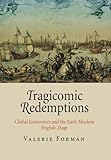Tragicomic Redemptions : Global Economics and the Early Modern English Stage / Valerie Forman.
Material type: TextPublisher: Philadelphia : University of Pennsylvania Press, [2013]Copyright date: ©2008Description: 1 online resource (288 p.)Content type:
TextPublisher: Philadelphia : University of Pennsylvania Press, [2013]Copyright date: ©2008Description: 1 online resource (288 p.)Content type: - 9780812240962
- 9780812201925
- Drama -- Economic aspects -- England
- Drama -- Economic aspects
- Economics in literature
- English drama -- Early modern and Elizabethan, 1500-1600 -- History and criticism
- English drama -- Early modern and Elizabethan
- English drama -- Early modern and Elizabethan, 1500-1600 -- History and criticism
- Literature and globalization
- Literature and society -- England
- Theater -- Economic aspects -- England
- Theater -- Economic aspects
- Theater -- England -- History -- 16th century
- Theater -- England -- History -- 17th century
- Literature
- LITERARY CRITICISM / European / English, Irish, Scottish, Welsh
- Cultural Studies
- Literature
- Medieval and Renaissance Studies
- 822.3/093553
- online - DeGruyter
- Issued also in print.
| Item type | Current library | Call number | URL | Status | Notes | Barcode | |
|---|---|---|---|---|---|---|---|
 eBook
eBook
|
Biblioteca "Angelicum" Pont. Univ. S.Tommaso d'Aquino Nuvola online | online - DeGruyter (Browse shelf(Opens below)) | Online access | Not for loan (Accesso limitato) | Accesso per gli utenti autorizzati / Access for authorized users | (dgr)9780812201925 |
Browsing Biblioteca "Angelicum" Pont. Univ. S.Tommaso d'Aquino shelves, Shelving location: Nuvola online Close shelf browser (Hides shelf browser)

|

|

|

|

|

|

|
||
| online - DeGruyter The Origins of Jewish Secularization in Eighteenth-Century Europe / | online - DeGruyter The Power of Money : Coinage and Politics in the Athenian Empire / | online - DeGruyter Doctor Franklin's Medicine / | online - DeGruyter Tragicomic Redemptions : Global Economics and the Early Modern English Stage / | online - DeGruyter Tinkering : Consumers Reinvent the Early Automobile / | online - DeGruyter Character's Theater : Genre and Identity on the Eighteenth-Century English Stage / | online - DeGruyter The People of the Parish : Community Life in a Late Medieval English Diocese / |
Frontmatter -- Contents -- Introduction. The Economics of Redemption -- Part I. Tragicomedy and Generic Expansion -- Chapter One. Stasis and Insularity in The Merchant of Venice and Twelfth Night -- Chapter Two. The Voyage Out: Pericles -- Chapter Three. Poverty, Surplus Value, and Theatrical Investment in The Winters Tale -- Part II. Eastern Engagements -- Chapter Four. Captivity and "Free" Trade -- Chapter Five. Balance, Circulation, and Equity in the "Prosperous Voyage" of The Renegado -- Epilogue. Webster's The Devil's Law-Case, the Limits of Tragicomic Redemption, and Tragicomedy's Afterlife -- Epilogue Webster's The Devil's Law-Case, the Limits of Tragicomic Redemption, and Tragicomedy's Afterlife -- Bibliography -- Index -- Acknowledgments
restricted access online access with authorization star
http://purl.org/coar/access_right/c_16ec
In the early modern period, England radically expanded its participation in an economy that itself was becoming increasingly global. Yet less than twenty years after the highly profitable English East India Company made its first voyage, England was suffering from an economic depression, blamed largely on the shortage of coin necessary to exploit those very same profitable routes. How could there be profit in the face of so much loss, and loss in the face of so much profit?In Tragicomic Redemptions, Valerie Forman contends that three seemingly unrelated domains-the development of new economic theories and practices, especially those related to global trade; the discourses of Christian redemption; and the rise of tragicomedy as the stage's most popular genre-were together crucial to the formulation of a new and paradoxical way of thinking about loss and profit in relationship to one another.Forman reads plays-including Shakespeare's Twelfth Night, The Merchant of Venice, Pericles, and The Winter's Tale, Fletcher's The Island Princess, Massinger's The Renegado, and Webster's The Devil's Law-Case-alongside a range of historical materials that provide a fuller picture of England's participation in a global economy: the writings of the country's earliest economic theorists, narrative accounts of merchants and captives in the Spice Islands and the Ottoman Empire, and documents that detail the development of the English East India Company, the Levant Company, and even the very idea of the joint-stock company. Unique in its dual focus on literary form and economic practices, Tragicomic Redemptions both shows how concepts fundamental to capitalism's existence, such as "free trade," and "investment," develop within a global context and reveals the exceptional place of dramatic form as a participant in the newly emerging, public discourse of economic theory.
Issued also in print.
Mode of access: Internet via World Wide Web.
In English.
Description based on online resource; title from PDF title page (publisher's Web site, viewed 24. Apr 2022)


